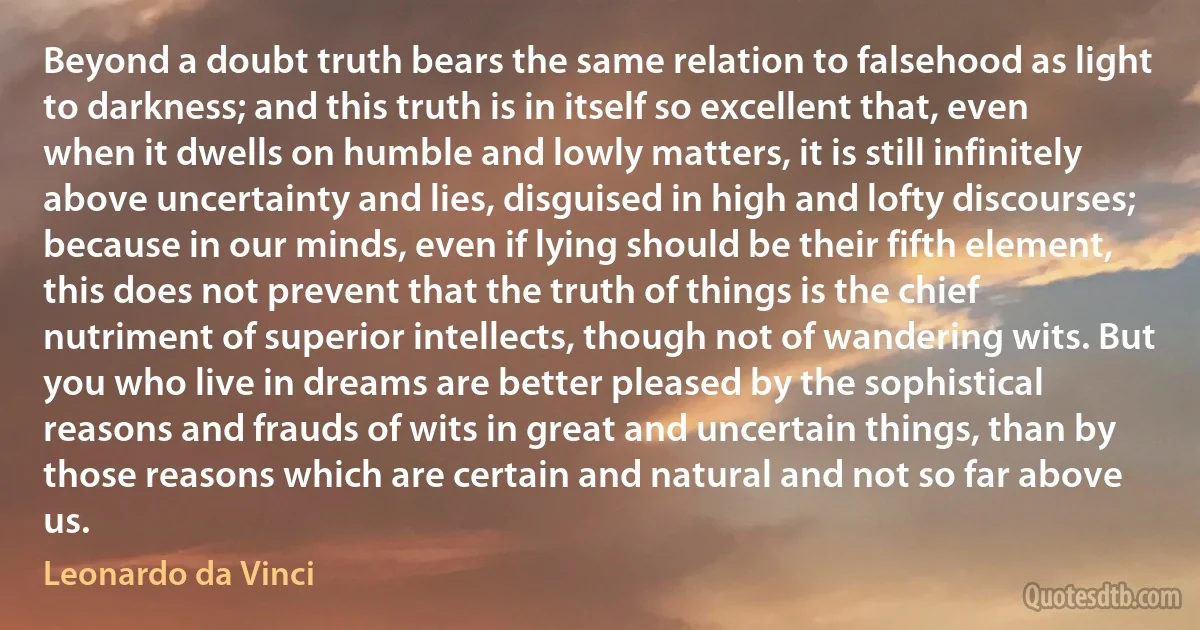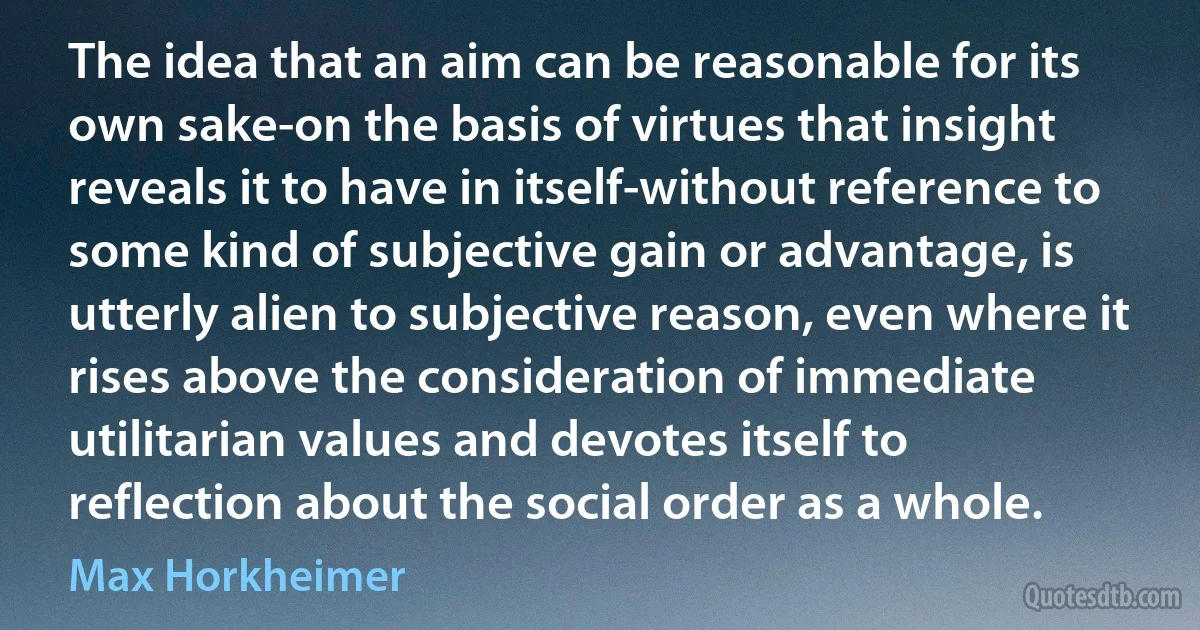Above Quotes - page 68
In the months before I made wiki, we had been having an argument. I think Kent Beck and I were on one side. People who had a lot of faith in the prevailing dogma of software engineering were on the other side. We said, "Collective code ownership is good." They said, "That's ridiculous. You'll never get responsibility. You'll never get quality if you don't have responsibility. And the only way you'll get responsibility is ownership. You have to pin the bugs back on somebody if you want them to ever rise above producing bugs."

Ward Cunningham
The soul seems to reside in the judgment, and the judgment would seem to be seated in that part where all the senses meet; and this is called the Common Sense and is not all-pervading throughout the body, as many have thought. Rather is it entirely in one part. Because, if it were all-pervading and the same in every part, there would have been no need to make the instruments of the senses meet in one centre and in one single spot; on the contrary it would have sufficed that the eye should fulfil the function of its sensation on its surface only, and not transmit the image of the things seen, to the sense, by means of the optic nerves, so that the soul - for the reason given above - may perceive it in the surface of the eye.

Leonardo da Vinci
The bugle echoes shrill and sweet,
But not of war it sings to-day.
The road is rhythmic with the feet
Of men-at-arms who come to pray. The roses blossom white and red
On tombs where weary soldiers lie;
Flags wave above the honored dead
And martial music cleaves the sky. Above their wreath-strewn graves we kneel,
They kept the faith and fought the fight.
Through flying lead and crimson steel
They plunged for Freedom and the Righteousness. May we, their grateful children, learn
Their strength, who lie beneath this sod,
Who went through fire and death to earn
At last the accolade of God.In shining rank on rank arrayed
They march, the legions of the Lord;
He is their Captain unafraid,
The Prince of Peace . . . Who brought a sword.

Joyce Kilmer
Anyone who feels the urge to undertake such a task must dedicate himself for his labors as he would prepare for a pilgrimage to distant lands. He must spare no time or effort, fear no earthly power or rank, and rise above his own vanity or false modesty in order to tell, in accordance with the expression of the Code Napoléon, the truth, the whole truth, and nothing but the truth.

Carl von Clausewitz
The moral elements are among the most important in war. They constitute the spirit that permeates war as a whole, and at an early stage they establish a close affinity with the will that moves and leads a whole mass of force, practically merging with it, since the will is itself a moral quantity. Unfortunately they will not yield to academic wisdom. They cannot be classified or counted. They have to be seen or felt. ... It is paltry philosophy if in the old-fashioned way one lays down rules and principles in total disregard of moral values. As soon as these appear one regards them as exceptions, which gives them a certain scientific status, and thus makes them into rules. Or again one may appeal to genius, which is above all rules; which amounts to admitting that rules are not only made for idiots, but are idiotic in themselves.

Carl von Clausewitz
Britain's victories are barren; they leave her poor, and they leave her people hungry; they leave her bereft of the markets and the wealth that she possessed six years ago. But above all, they leave her with an immensely greater problem than she had then. We are nearing the end of one phase of Europe's history, but the next will be no happier. It will be grimmer, harder and perhaps bloodier. And now I ask you earnestly, can Britain survive? I am profoundly convinced that without German help she cannot.

William Joyce
If we consider the attitude of the Lord Himself, we understand that He accepted the free loving services of women for Himself and His Apostles and that women were among His disciples and most intimate confidants. Yet He did not grant them the priesthood, not even to His mother, Queen of Apostles, who was exalted above all humanity in human perfection and fullness of grace.

Edith Stein
Because our time is struggling toward the word with which it may express its spirit, many names come to the fore and all make claim to being the right one. [...] Without our assistance, time will not bring the right word to light; we must all work together on it. If, however, so much depends on us, we may reasonably ask what they have made of us and what they propose to make of us; we ask about the education through which they seek to make us creators of that word. Do they conscientiously cultivate our predisposition to become creators or do they treat us only as creatures whose nature simply permits training? [...] Therefore we are concerned above all with what they make of us in the time of our plasticity; the school question is a life question.

Max Stirner
A successful individual typically sets his next goal somewhat but not too much above his last achievement. In this way he steadily raises his level of aspiration... The unsuccessful individual on the other hand, tends to show one of two reactions: he sets his goal very low, frequently below his past achievement... or he sets his goals far above his abilities.

Kurt Lewin
The social product grows from year to year. Who is now the true creator of this surplus value which grows wildly and beyond any measure? Who can afford to figure out the profit yielded causally adequate by this immense wealth and the series of economic miracles? In concrete terms: who is the legitimate distributor of the social product and who actually assesses the shares in practical life? As long as the issue is about value, all such questions must above all be formulated as economic questions.

Carl Schmitt
It always demands a far greater degree of courage for an individual to oppose an organized movement than to let himself be carried along with the stream - individual courage, that is, a variety of courage that is dying out in these times of progressive organization and mechanization. During the war practically the only courage I ran across was mass courage, the courage that comes of being one of a herd, and anyone who examines this phenomenon more closely will find it to be compounded of some very strange elements: a great deal of vanity, a great deal of fear - yes, fear of staying behind, fear of being sneered at fear of independent action, and fear, above all, of taking up a stand against the mass enthusiasm of one's fellows.

Stefan Zweig
Truth', written 'in capital letters', is an orphan in this world, without power and influence... ['Reason'] cannot stand diverging opinions - it calls them 'lies'; it puts itself 'above' the real lives of human beings, demanding, in a way characteristic of all totalitarian ideologies, the right to rebuild the world from the height of 'what it should be', i. e. in accordance with its own 'invincible' precepts. It refuses to recognize the many ideas, actions, feelings, laws, institutions, racial features which separate one nation (culture, civilization) from another... The reason of ordinary people trying to create a better and safer world for themselves and their children (which is reason with a small 'r' and not Reason 'written in capital letters') has very little in common with these ignorant dreams of domination.

Paul Karl Feyerabend
So far as one understands a man, one is that man. The man of genius takes his place in the above argument as he who understands incomparably more other beings than the average man. Goethe is said to have said of himself that there was no vice or crime of which he could not trace the tendency in himself, and that at some period of his life he could not have understood fully. The genius, therefore, is a more complicated, more richly endowed, more varied man; and a man is the closer to being a genius the more men he has in his personality, and the more really and strongly he has these others within him.

Otto Weininger
The members of the Vienna Circle (Moritz Schlick, Rudolf Carnap, Philipp Frank, Hans Hahn, Herbert Feigl, Fritz Waismann, Kurt Godel, Otto Neurath and others) are working out a ‘Logical Empiricism'. Following Ernst Mach and Poincaré, but above all Russell and Wittgenstein, all the sciences are treated uniformly. Carnap's Logischer Aufbau der Welt (1928) shows in which direction future systematic work will move. Wittgenstein's Tractatus Logico-Philosophicus (1921) clarified, among other things, the position of logic and mathematics; besides the statements that make additions to what is meaningful, there are the ‘tautologies' that show us which transformations are possible within language. By its syntax the language of science excludes anything that is meaningless from the very beginning.

Otto Neurath
We went on in our quiet way. Life was purer and simpler and less annoyed to us, because constantly, now, we met with near and dear friends whom we had not known a day before, who looked up and not down, looked out and not in, looked forward and not backward, and were ready to lend a hand. Life seemed simpler to them, and it is my belief that to all of us, in proportion as we bothered less about cultivating ourselves, and were willing to spend and be spent for that without us, above us, and before us, life became infinite and this world became heaven.

Edward Everett Hale



